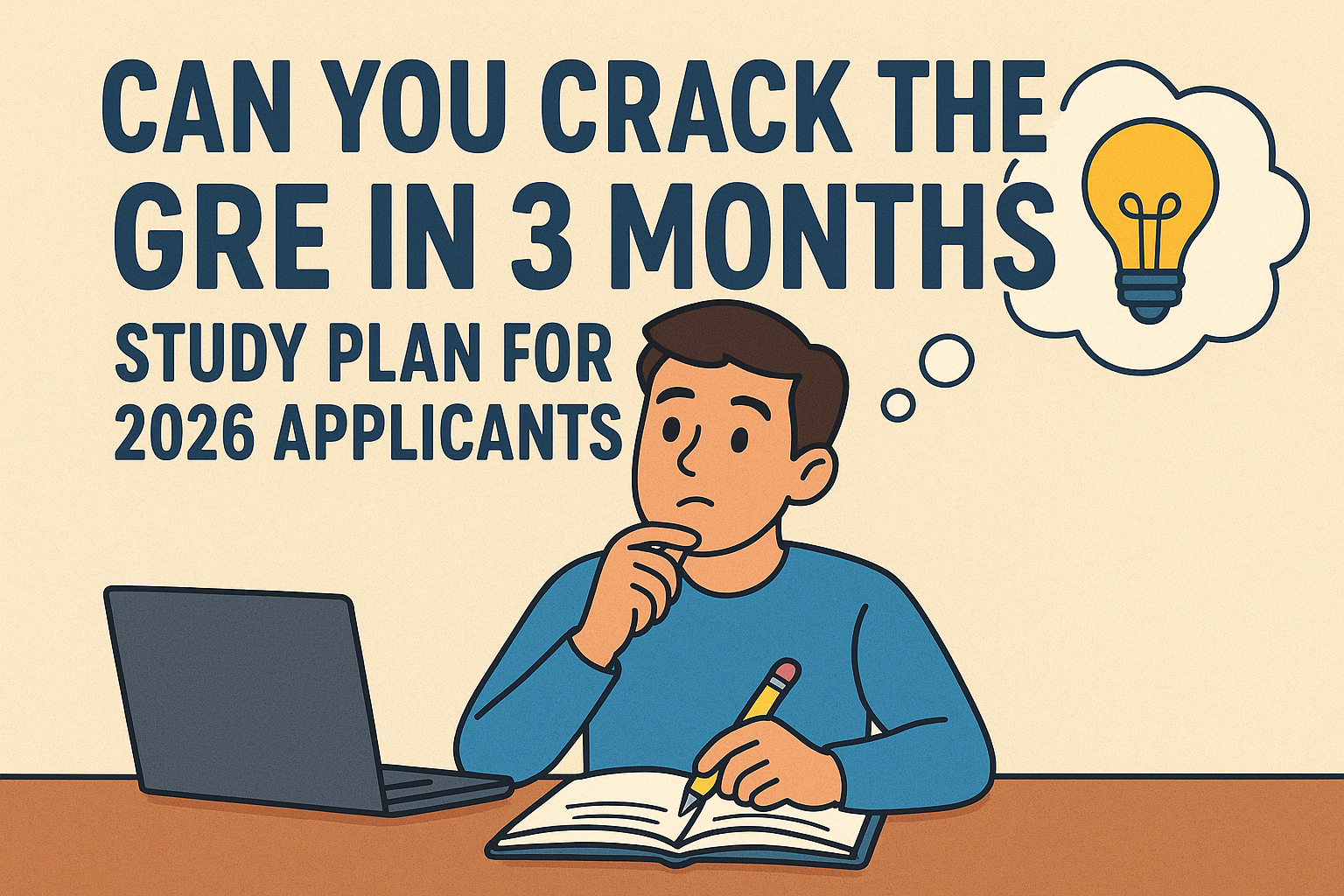Preparing for the GRE can feel intimidating, especially when time is limited. The question that is posed by many students is whether they can master the exam within three months. The answer is yes. Due to the strict study schedule, frequent training, and good understanding of the curriculum, you can score well even in cases where the preparation time is minimal.
What is GRE?
The Graduate Record Examination is the full name of the GRE. For people who wish to enroll in graduate and business schools around the world, they must take this standardized test. The GRE evaluates a person's capacity for critical thought, information analysis, and effective communication.
It is important to remember that the purpose of the GRE exam is to evaluate students' preparedness for advanced coursework. GRE scores are used for eligibility and verification by major government and private sector portals, and many colleges in the US, UK, Canada, and other nations accept them as part of their admissions process.
| Section | Skills Tested | Purpose |
|---|---|---|
| Verbal Reasoning | Vocabulary, reading comprehension, grammar | Tests your ability to understand and interpret written material |
| Quantitative Reasoning | Arithmetic, algebra, geometry, data analysis | Assesses your problem-solving using quantitative methods |
| Analytical Writing | Issue and argument essays | Evaluates your critical thinking and written communication skills |
GRE Syllabus Overview
The GRE syllabus is divided into three main parts: Verbal Reasoning, Quantitative Reasoning, and Analytical Writing. Each part requires a specific preparation strategy.
| Section | Key Topics |
|---|---|
| Verbal Reasoning | Reading comprehension, sentence equivalence, and text completion |
| Quantitative Reasoning | Algebra, arithmetic, geometry, and data interpretation |
| Analytical Writing | Writing tasks on issue and argument analysis |
Students often find verbal reasoning challenging due to complex vocabulary and lengthy passages. Regular reading and vocabulary practice help strengthen this area.
Three-Month GRE Study Plan for 2026 Applicants
A good schedule lets you finish the GRE material, study well, and take many practice tests. This 12‑week plan gives a balanced way for those who want to take the GRE in 2026.
| Month | Goal | Focus Area | Recommended Study Time |
|---|---|---|---|
| Month 1 | Build foundation | Learn core GRE topics and vocabulary | 2 hours per day |
| Month 2 | Strengthen application | Practice Verbal Reasoning & Quantitative sections | 2–3 hours per day |
| Month 3 | Test readiness | Take full-length mock tests & review errors | 3 hours per day |
Weekly Study Breakdown
| Week | Focus | Key Activities |
|---|---|---|
| Week 1–2 | Concept building | Review Quant basics, learn 20-30 new words daily |
| Week 3–4 | Verbal reasoning practice | Sentence completion, reading comprehension |
| Week 5–6 | Combined practice | Mix verbal and quantitative sets |
| Week 7–8 | Timed mock tests | Two full-length tests per week |
| Week 9–12 | Final review | Focus on weak areas, analytical writing |
This is a schedule that can be applied by students, as well as working people. People can use it when they visit websites such as the National Scholarship Portal (NSP) in India and when they use individual sector websites such as the Inlaks Shivdasani Foundation scholarship portal. GRE results can be uploaded or accepted through these sites for more scholarships or job opportunities.
GRE Exam Dates and Registration Details
The GRE test dates are available throughout the year, allowing flexibility in scheduling. For 2026 applicants, registering early helps secure preferred GRE dates and test centres.
| Step | Action | Recommendation |
|---|---|---|
| Step 1 | Create an account with the Educational Testing Service (ETS) | Use an active email address for notifications |
| Step 2 | Choose test location | Select a nearby centre or home-based test |
| Step 3 | Pick your GRE dates | Align with university admission deadlines |
| Step 4 | Pay registration fees | Save the receipt for future reference, and note the GRE results submission requirement. |
After completing the GRE exam, candidates typically receive GRE results within 10–15 days. Results are accessible on the official ETS portal and can also be shared with government and private sector portals that verify academic qualifications, such as NSP or specific scholarship portals.
Tips to Crack the GRE Exam in 3 Months
- Understand the GRE exam: It focuses on reasoning and logic rather than simple memorization.
- Follow the GRE syllabus closely: Cover every topic and review the toughest sections regularly.
- Prioritise verbal reasoning: Read academic articles and steadily build your vocabulary.
- Complete periodic mock exams: Replicate the examination environment and review your errors.
- Track GRE results: Review your progress every week and adjust your strategy as needed.
Consistency and time management are essential for mastering the GRE in three months.
GRE Results and Their Importance
GRE results provide detailed insight into your performance in each section. Universities consider both the total and sectional scores when making admission decisions.
| Section | Score Range |
|---|---|
| Verbal Reasoning | 130–170 |
| Quantitative Reasoning | 130–170 |
| Analytical Writing | 0–6 |
An increased score may also be utilized in the case of applying to research grants, scholarships, and professional programs via government portals such as NSP or private foundation portals.
Opportunities Beyond Admissions
- Government Portals: The National Scholarship Portal (NSP) by the Government of India uses test scores and academic records for scholarships and fellowships.
- Private Sector Portals: Foundations like the Inlaks Shivdasani Foundation and other private scholarship portals consider GRE results and academic excellence when selecting candidates.
| Sector | Opportunities Linked with GRE |
|---|---|
| Government | Scholarships, higher education grants via NSP, and other portals |
| Private Sector | Corporate-sponsored education programmes, foundation scholarships |
FAQs
Q1: What is GRE?
ANS. The GRE full form is Graduate Record Examination. It is a global test for master’s and PhD admissions, checking math, verbal reasoning, and writing skills.
Q2: What is the GRE exam?
ANS. The GRE exam measures your academic skills in math, verbal reasoning, and writing. It helps universities judge readiness for advanced studies.
Q3: Can I crack the GRE in 3 months?
ANS. Yes! With a smart 3-month plan, covering the GRE syllabus, daily practice, and timed tests, you can improve scores and be exam-ready.
Q4: What are the GRE exam dates?
ANS. GRE dates or GRE test dates are available year-round. Pick a date that gives you enough time to complete preparation and practice.
Q5: How to track GRE results?
ANS. After the GRE exam, you get GRE results online within 10–15 days. Review scores to plan next steps or share with universities.
Q6: How to prepare for verbal reasoning?
ANS. Practice daily reading, learn words, solve verbal reasoning questions from the GRE syllabus, and take mock tests to improve speed and accuracy.
Q7: What topics are in the GRE syllabus?
ANS. The GRE syllabus includes math, verbal reasoning, and essay writing. Cover each topic step by step and practice questions daily.
Q8: What is GRE full form used for?
ANS. The GRE full form shows your eligibility for master’s or PhD programs globally. Many universities use it to assess skills in verbal reasoning, math, and writing.

